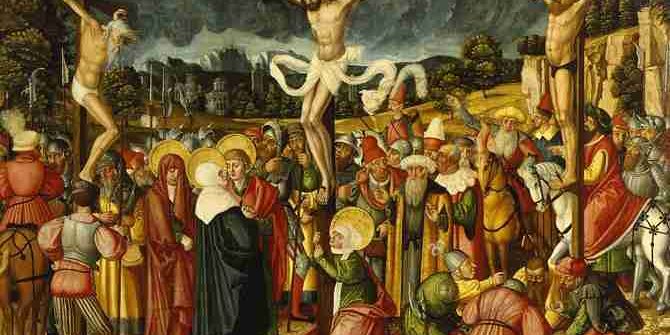
Getting the God of the Cross Right…And Very Wrong: A Response to Fleming Rutledge (Stephen J. Wellum)
Fleming Rutledge’s book on the cross, The Crucifixion: Understanding the Death of Jesus Christ (Eerdmans, 2015), received a favorable review from notable voices inside and outside evangelicalism. In fact, it was Christianity Today’s 2017 Book of the Year. In the newest issue of Credo Magazine, “The Glory of the Atonement,” Dr. Stephen Wellum responded to Rutledge’s volume, offering a summary and critique.
Stephen J. Wellum is Professor of Christian Theology at The Southern Baptist Theological Seminary. He is the author of Kingdom Through Covenant: A Biblical-Theological Understanding of the Covenants; God the Son Incarnate; Christ Alone; and Christ from Beginning to End.
Here is an excerpt from Dr. Wellum’s article:
It is not surprising that so many people have praised this book. It is beautifully written, well-researched and it says so many things well. Orthodox Trinitarianism and Christology is affirmed, human sin is described in all of its horrors, and God’s sovereign initiative to save is wonderfully taught. It engages Scripture, historical theology, and contemporary thought, and it includes many profound insights. It holds together Christ’s substitutionary work by Christus Victor. Rutledge has thought deeply about the cross. However, I also find the book problematic, and I am convinced that she has not theologized correctly about the cross or put together the biblical data on the Bible’s own terms. I offer three points of criticism.
First, regarding the biblical language of the cross, Rutledge often sides with interpretations that are problematic. Here are a few examples. First, she holds that propitiation is best understood as expiation and the word does not convey that God is wrathful against individual sin. God’s wrath is only against the effects of sin. Not only is this difficult to substantiate linguistically, it is also difficult to sustain in terms of the Bible’s entire storyline, where God’s wrath against sin is no insignificant detail. Or, she views redemption as merely “deliverance” but not by payment of a price. Or, reconciliation has nothing to do with God being reconciled to us, but only from the human side of things. Or, the sacrificial system does not teach us that God both initiates to provide—the subject—but also that he provides to meet his own righteous demand against us (Lev 17:11)—thus also the object of the sacrifices. Or, the “righteousness of God” only refers to God’s saving faithfulness or rectification—what God does—and not who God is as self-sufficient. No doubt, these issues have been debated for years, but in my view, the case has not been made convincingly for how Rutledge interprets the biblical language to eliminate notions of God’s wrath against individuals, and God, as the holy one, who is both the subject and the object of the cross.
No first Adam to make sense of the Last Adam
Second, I am not convinced that her understanding of the biblical storyline which provides the framework to understand the cross is correct. For example, her emphasis on Sin and its Power and the need for Christ to act as our substitute to defeat the Powers, is undercut by her denial of the historicity of Adam and the fall. Not only is it difficult to deny the historicity of these events on the Bible’s own terms, but if one rejects the original moral goodness of this world which is now fallen due to Adam’s rebellion in history, then one has to affirm that all of the Sin and evil around us is original to God’s creation. But if this is so, then what is the cross doing? In Scripture, the cross solves the problem of sin which is viewed as an abnormality to this world. Yes, God is making all things right by reversing the effects of sin, destroying its power, and making a new world. But unless there is an historic Adam who stands as the representative covenant head of the human race, and by his disobedience brings sin into the world, the rationale for the obedience and recapitulation work of the Last Adam is undercut.
In addition, Rutledge does not view the primary problem of sin as human rebellion against God, nor does she see God, as the holy one, bringing judgment upon our sin which results in death, injustices, Satan’s power over us, etc. (Rom. 6:24; Col. 2:13-15; Heb. 2:14-18). Viewed this way, to rectify all the injustices of this world, the first relationship to be restored is the vertical not the horizontal. In other words, horizontal rectification is the result of vertical reconciliation and justification. This point leads to my third and most serious point of concern.
God’s justice no longer essential to him?
Third, what is lacking the most is viewing God’s justice as essential to him. Rutledge privileges rectoral justice, or “God’s righteousness,” as God doing something—rectification—rather than who he is in himself as the moral standard and Judge. In fact, this seems to be the reason why she denies a strong retributive sense to justice which leads to her denial that God is both the subject and object of the cross. She affirms substitution but not penal substitution. This only makes sense if she does not ground God’s justice in himself, that is, who God is essentially, and thus the moral standard of the universe. However, God is not like human judges who adjudicate laws external to them; instead, the triune God is the law. When God judges he remains true to his own perfect, moral demand–that is, he remains true to himself. Sin, then, is first against God who is holy and just; for sinners to be declared just, our justification before God requires that our sin be fully paid and that we have a perfect righteousness by imputation. Failing to emphasize the inner life of God as the source and standard of justice is a major lacuna in Rutledge’s work, and, in my view, skews the biblical framework for understanding the nature and necessity of the cross.


